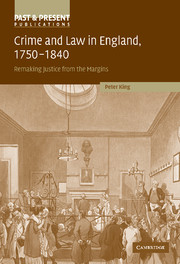Book contents
- Frontmatter
- Contents
- Preface
- List of figures
- List of tables
- 1 Shaping and remaking justice from the margins. The courts, the law and patterns of lawbreaking 1750–1840
- Part I Juveniles
- Part II Gender
- Part III Non-lethal violence
- Part IV The attack on customary rights
- 9 Legal change, customary right and social conflict in late eighteenth-century England: the origins of the Great Gleaning Case of 1788
- 10 Gleaners, farmers and the failure of legal sanctions in England 1750–1850
- Index
- Past and Present Publications
10 - Gleaners, farmers and the failure of legal sanctions in England 1750–1850
Published online by Cambridge University Press: 25 July 2009
- Frontmatter
- Contents
- Preface
- List of figures
- List of tables
- 1 Shaping and remaking justice from the margins. The courts, the law and patterns of lawbreaking 1750–1840
- Part I Juveniles
- Part II Gender
- Part III Non-lethal violence
- Part IV The attack on customary rights
- 9 Legal change, customary right and social conflict in late eighteenth-century England: the origins of the Great Gleaning Case of 1788
- 10 Gleaners, farmers and the failure of legal sanctions in England 1750–1850
- Index
- Past and Present Publications
Summary
Through an analysis of the conflicts that arose when the propertied attempted to undermine the gleaning rights of the poor in the century after 1750, this article reassesses both the degree to which the courts could be used by the propertied against the poor and the specific model of a ‘transition from custom to crime’ used by some historians of law and social relations in this period. Gleaning was an important source of income for labouring families. The uncut or fallen grain left in the fields after the harvest sometimes accounted for more than a tenth of their annual income. Gleaning was particularly important in the predominantly grain-growing region of East Anglia, the area which forms the primary focus of this study. In this region the loss of spinning and other by-employments and the decline of female wage-earning opportunities in agriculture meant that gleaning played an increasingly central part in early nineteenth-century descriptions of women's work. When the farmers began to use legal sanctions to attack the gleaners’ rights in the late eighteenth century, one of the few ways by which women could safeguard their households against the privations of winter was severely threatened, and although the resulting disturbances have received scant attention from historians of women's protest, the gleaners were not slow to act collectively in defence of their customary rights.
- Type
- Chapter
- Information
- Crime and Law in England, 1750–1840Remaking Justice from the Margins, pp. 308 - 338Publisher: Cambridge University PressPrint publication year: 2006



